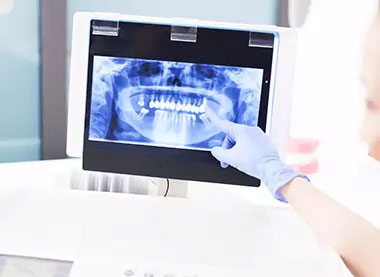Dental Implants vs Bridges

Dental implants are the next best thing to natural healthy teeth and represent a major milestone in modern dentistry and are now a popular alternative to bridges. They provide a solid base for artificial teeth and are used in place of bridges or to support a dental plate.
The problem with bridges is that the process requires removing a substantial amount of enamel from adjacent teeth. With implants, however, a tooth can be replaced without damage to surrounding teeth, to provide a strong, permanent solution. Another advantage of implants is that they make oral hygiene easier. Bridges are cemented in the mouth, with crowns connected together to fill the space of the missing tooth, which creates problems when brushing and flossing and demands meticulous care. Implants, which look and feel like natural teeth, allow you to brush and floss just as you would normally.
Implants are also more durable than bridges, providing a tooth replacement system that can last a lifetime. What Is a Dental Implant?
An implant consists of a small metal post that’s surgically inserted into the bone socket of a missing tooth. When the implant has bonded to the bone, an abutment is fitted to hold the new tooth securely in place. A crown is then fixed onto the abutment.
What Is a Dental Bridge?
Bridges, as the name suggests, span the space left by missing teeth. They are cemented to natural teeth or implants around the gap. Abutments, which are the teeth on either side of the gap will anchor the bridge, and an artificial tooth is attached to crowns that cover the abutments.
Appearance and Costs
In many cases, an implant provides a more aesthetically-pleasing result than bridges. Artificial teeth with implants can be made to look just like the natural enamel of teeth. Sometimes, an implant can be inserted straight after a tooth extraction, retaining bone structure, and enhancing the final appearance of the treatment.
When it comes to cost, bridges are initially less expensive than implants. However, bridges have to be replaced eventually, typically after 10 years. Implants may appear more expensive but over time, being a permanent fix can be more cost-effective.
Implant treatment can also be more flexible, enabling patients to budget the cost in stages. After an extraction, for instance, a bone graft is sometimes required. The graft usually needs to heal over several months before implant placement. Afterward, osseointegration – bone attaching directly to the implant – can take from three to six months before the process is complete.
Protection from Cavities and Gum Disease
Part of the natural tooth remains underneath a bridge and continues to be prone to decay and gum disease. On the other hand, implants are extremely resistant to cavities and gum problems like gingivitis and periodontitis.
This is because implants are made from titanium, with the metal rod being inserted into the socket of a lost tooth. Titanium is not only compatible with the human body, but when used as a dental implant it actually promotes bone growth, as the jaw grows back around it, holding it firmly in place.
Advantages of Dental Implants
Aesthetics is a big factor for most patients when deciding whether implants or bridges are the right choice. Many opt for implants because the final replacement tooth looks so natural. Dr. Schmidt a Boise dentist adds that with the proper care dental implants can last a life time.
Implants hold several advantages over bridges, including:
- A solution that can last a lifetime.
- Adjacent teeth are not affected.
- Implants are far less vulnerable to cavities and gum problems.
- The new teeth look and feel natural.
- Multiple implants can be fitted in one surgical procedure.
Benefits of Dental Bridges
However, a bridge may be the better option if the surrounding teeth are likely to need caps or crowns in the future, or when the tooth or teeth have been missing for a long time and the gum and bone have receded significantly.
Benefits of a dental bridge include:
- Functionality and reliability.
- Non-surgical procedure.
- Can be fitted in two or three treatment sessions.
- Recommended in cases of jaw bone loss.
- Less planning and preparation time than implants.
Look for a Qualified Implant Surgeon
According to the American Academy of Implant Dentistry (AAID), implants are suitable for anyone in good general health whose jaw has fully developed.
Implants can transform your life in terms of both functionality and aesthetics. If you’re thinking about having dental implants, look for an implant specialist who will tell you whether this is the right treatment for your dental health and who will provide a high level of comfort and safety throughout the treatment.














Please login to publish a comment.
Comments (0)